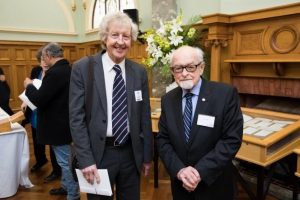
Dr. Brian Opie and Jim Traue, former Chief Librarian of the Alexander Turnbull Library at the 28 June 2018 Friends of the Turnbull Library Founder Lecture given by Dr. Lydia Wevers.
(Photo by Mark Beatty. From https://natlib.govt.nz/blog/posts/dr-lydia-wevers-books-and-their-readers)
I am sad to report that Dr. Brian Opie of VUW passed away this week. Brian was a pioneer in pushing for the study of NZ print culture, coordinating the first Marsden grant to support the field back in the late 1990s. Brian’s own major contribution to the field focused on William Golder (1810–1876), who published The New Zealand Minstrelsy by subscription in 1852. That volume was the first book of poetry printed and published in New Zealand. Brian also served for many years as editor of the Turnbull Library Record and was very active in the leadership of the Friends of the Turnbull Library.
In 2005 he established Te Whãinga Aronui The Council for the Humanities to advocate for better government support for humanities research. In the end, the Royal Society of NZ extended its membership to humanities scholars, though the fit has not necessarily been ideal, as Brian explained in a 2019 interview that appeared in Educational Philosophy and Theory, 51:13, 1283–92:
[I]t was readily agreed between HUMANZ and those managing RSNZ that there needed to be two organisations because the knowledge systems they represented were complementary, not simply elidable. However, once the elision was undertaken, it was not long before the glaring anomaly, the separate humanities panel [for research assessment], was dissolved in favour of a panel combining social sciences and humanities. Getting the ‘creative’ into that structure has been problematic for a long time, and it’s been accomplished in part by the way the sciences have laid claim to the term themselves, consistent with the reigning value of innovation…. The day when poetry and novels can be advanced as evidence in an evidence-based policy discussion (now a vacated nineteenth-century conception) will be the day when the humanities and arts reassert their foundational significance for the knowledgable evolution of human(e) societies.
Book History and Humanities will mourn the loss of Brian’s committed advocacy, always conveyed in a soft voice from a warm-hearted scholar. Messages for the family can be sent C/- Lychgate Funerals, 306 Willis St, Aro Valley, Wellington.

